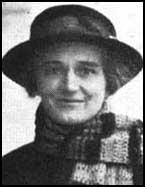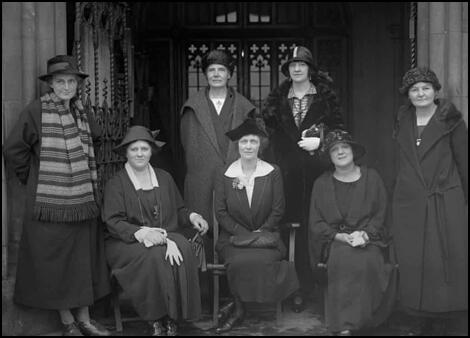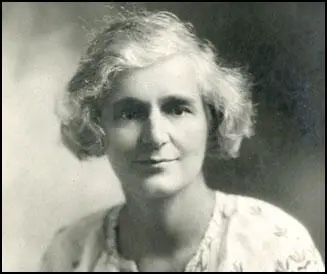Dorothy Jewson

Dorothy Jewson, the daughter of George Jewson, a wealthy coal merchant and Mary Jane Jarrold, was born in Norwich on 17th August, 1884.
Dorothy was educated at Cheltenham College and Girton College, Cambridge. She also went to Cambridge Training College and afterwards taught at Richmond School (1908-11) and in a board school in Norwich. With her brother, she carried out a large-scale investigation into poverty in the city. This was published as The Destitute of Norwich.
Jewson was involved with the Fabian Society while at Girton but later found the organisation too moderate and joined the Independent Labour Party. Jewson also became a member of the Women's Social and Political Union but there is no evidence that she took part in militant activities. As a pacifist Jewson was a strong opponent of Britain's involvement in the First World War.
In 1916 Mary Macarthur invited Jewson to become an organiser for the National Federation of Women's Workers (NFWW) where she worked closely with Margaret Bondfield. When the NFWW amalgamated with the National Union of General & Municipal Workers in 1921, Jewson worked for the newly formed women's section.
Jewson was active in the local Labour Party and in the 1923 General Election she was elected as the MP for Norwich. In her maiden speech, she advocated bringing down the voting age of women to twenty-one. After she was defeated in the 1924 General Election she was appointed to the National Council of the Independent Labour Party.

(L-R) Dorothy Jewson, Susan Lawrence, Nancy Astor, Margaret Winteringham,
Mabel Philipson, Vera Terrington and Margaret Bondfield.
On 29 February, 1924, Jewson joined William Adamson in putting forward a motion to reduce the age that women could vote from 30 to 21, the same age as men. It was Jewson's first speech in the House of Commons. Estimates at the time suggested that this proposal would have meant half a million more women than men on the electoral register, and that 70% of wage earning women at the time were currently unable to vote. Jewson pointed out that the 1918 Qualification of Women Act was only a temporary measure.
"Following on the 1918 Act, which was only accepted as a compromise and a temporary measure, the Coalition Government at the General Election in 1918 declared in their election manifesto that it will be the duty of the new Government to remove all existing inequalities between men and women. I think the women of the country interpreted that as an intention on the part of the Government at least to remove the existing inequalities in the franchise. That pledge was never carried out. In 1919, 1920, 1922, 1923 Bills came before this House and were carried on Second Heading, and in some cases on Third Reading. The time has come when the House ought to consider not merely talking about this question of equal franchise, but acting on it."
Jewson pointed out: "We believe that the 1918 Act was a compromise. It was only accepted, very reluctantly, by women's organisations in the country because it was agreed that to add 7,000,000 or 8,000,000 of new electors to the register was a very big experiment. I think no hon. Member will deny that that experiment of 1918 has been amply justified. We have had six years in which to consider whether or not that experiment was justified. In that time, we have had three elections, and I think every hon. Member will agree that in those elections women have shown very great interest, and an increasing interest, in national and international affairs. Uncertainty was expressed at the time as to how women would vote. I think everyone must now admit that they have exercised their vote wisely and well. Some fears were expressed that women might combine as a sex, and it was felt that that would be dangerous, because women who would be in larger numbers than men might so exercise the vote that we might have petticoat government. Events have shown that those fears were not founded on fact. The women have shown that they differ, like men differ, in their opinions; they have divided into parties in just the same way as men, and there is really no fear that women will combine as a sex and vote against the men. In an electorate of 26,000,000, it has been estimated that if women receive the vote on the same qualification as men there will be only about 500,000 more women on the register than men, and that half million would, of course, be spread over many constituencies."
Jewson argued: "I wish to draw attention to the very great injustice that is done to large bodies of women by their exclusion from the franchise. There is a large body of young wives and mothers who feel, very naturally, that if they are capable of bringing children into the world, and of being responsible to the State for those children, it is only right that they should have the privilege and protection of the vote in helping to mould the laws which will govern themselves and their children. Then there is the large body of wage-earning women. It is estimated that 70 per cent. of those women are under 30 years of age and are now excluded from the franchise. They have suffered intensely, and are now suffering, from low wages and under-employment, and as this House will be discussing during the next few years questions of a minimum wage, hours of work and other questions which vitally affect these women, the time has come when they should have some opportunity of exercising their control over the laws that are going to affect them. There are also large numbers of wage-earning women, professional women, business women, nurses, governesses and a large body of hotel and domestic workers who are altogether excluded, or practically excluded, from the exercise of the vote. It may be argued that domestic workers have not any knowledge of politics, and should, therefore, be excluded, but I do not think that is a fair argument, because the women have shown in exercising the vote that they have gained knowledge and that the vote in itself has been a liberal 865education for them. I would particularly draw attention to the report of the inquiry into domestic service, which was set up by the Minister of Labour in last Government, the Committee on which definitely recommends that to improve the status of domestic workers the women should be allowed to exercise the franchise." The Jewson motion was won 288 to 72, but the government decided not to legislate on this issue.
Jewson lost her seat in the 1924 General Election. Jewson now joined Dora Russell to form the Workers' Birth Control Group. Jewson was president and Russell, secretary of the organisation. Together they attempted to persuade the Labour Party to adopt the policy of government funded welfare centres to provide free birth-control advice. Worried about the impact this would have on potential Roman Catholic supporters, James Ramsay MacDonald argued strongly against it at the 1926 Party Conference and managed to have the proposal defeated.
Stanley Baldwin, wanted to change the image of the Conservative Party to make it appear a less right-wing organisation. In March 1927 He suggested to his Cabinet that the government should propose legislation for the enfranchisement of nearly five million women between the ages of twenty-one and thirty. This measure meant that women would constitute almost 53% of the British electorate. The Daily Mail complained that these impressionable young females would be easily manipulated by the Labour Party.
The 1928 Equal Franchise Act was introduced in March 1928 to give women the vote on the same terms as men. There was little opposition in Parliament to the bill and it became law on 2nd July 1928. As a result, all women over the age of 21 could now vote in elections. Many of the women who had fought for this right were now dead including Elizabeth Garrett Anderson, Barbara Bodichon, Emily Davies, Elizabeth Wolstenholme-Elmy, Constance Lytton and Emmeline Pankhurst.

Jewson was a member of Norwich City Council between 1927 and 1936. In later life, Jewson was active in the Society for Friends. Over the next few years she instigated the building of more parks and roads around Norwich, to increase employment.
A member of the Independent Labour Party (ILP) group she was a strong critic of James Ramsay MacDonald the leader of the party. At the 1929 Labour Party conference she put forward a resolution that there should be a higher taxation on the rich to pay for a children's allowance and at the 1930 conference she argued that inheritance tax should be used to "abolish inherited wealth".
Dorothy Jewson died on 29th February, 1964.
Primary Sources
(1) Dorothy Jewson, speech in the House of Commons (29th February, 1924)
I desire to draw attention to the fact that the principle of the Bill, to grant equal franchise to women, has been acknowledged and accepted by the House on a very large number of occasions by an overwhelming vote. Following on the 1918 Act, which was only accepted as a compromise and a temporary measure, the Coalition Government at the General Election in 1918 declared in their election manifesto that it will be the duty of the new Government to remove all existing inequalities between men and women. I think the women of the country interpreted that as an intention on the part of the Government at least to remove the existing inequalities in the franchise. That pledge was never carried out. In 1919, 1920, 1922, 1923 Bills came before this House and were carried on Second Heading, and in some cases on Third Reading. The time has come when the House ought to consider not merely talking about this question of equal franchise, but acting on it
We believe that the 1918 Act was a compromise. It was only accepted, very reluctantly, by women's organisations in the country because it was agreed that to add 7,000,000 or 8,000,000 of new electors to the register was a very big experiment. I think no hon. Member will deny that that experiment of 1918 has been amply justified. We have had six years in which to consider whether or not that experiment was justified. In that time, we have had three elections, and I think every hon. Member will agree that in those elections women have shown very great interest, and an increasing interest, in national and international affairs. Uncertainty was expressed at the time as to how women would vote. I think everyone must now admit that they have exercised their vote wisely and well. Some fears were expressed that women might combine as a sex, and it was felt that that would be dangerous, because women who would be in larger numbers than men might so exercise the vote that we might have petticoat government. Events have shown that those fears were not founded on fact. The women have shown that they differ, like men differ, in their opinions; they have divided into parties in just the same way as men, and there is really no fear that women will combine as a sex and vote against the men. In an electorate of 26,000,000, it has been estimated that if women receive the vote on the same qualification as men there will be only about 500,000 more women on the register than men, and that half million would, of course, be spread over many constituencies.
In supporting the Second Resolution, I wish to draw attention to the very great injustice that is done to large bodies of women by their exclusion from the franchise. There is a large body of young wives and mothers who feel, very naturally, that if they are capable of bringing children into the world, and of being responsible to the State for those children, it is only right that they should have the privilege and protection of the vote in helping to mould the laws which will govern themselves and their children. Then there is the large body of wage-earning women. It is estimated that 70 per cent. of those women are under 30 years of age and are now excluded from the franchise. They have suffered intensely, and are now suffering, from low wages and under-employment, and as this House will be discussing during the next few years questions of a minimum wage, hours of work and other questions which vitally affect these women, the time has come when they should have some opportunity of exercising their control over the laws that are going to affect them. There are also large numbers of wage-earning women, professional women, business women, nurses, governesses and a large body of hotel and domestic workers who are altogether excluded, or practically excluded, from the exercise of the vote. It may be argued that domestic workers have not any knowledge of politics, and should, therefore, be excluded, but I do not think that is a fair argument, because the women have shown in exercising the vote that they have gained knowledge and that the vote in itself has been a liberal 865education for them. I would particularly draw attention to the report of the inquiry into domestic service, which was set up by the Minister of Labour in last Government, the Committee on which definitely recommends that to improve the status of domestic workers the women should be allowed to exercise the franchise.
I have carefully looked through the Debates on this question in the House, and I have found no justification for the ago limit of women being fixed at 30, whereas for men it is fixed at 21. It has been pointed out on more than one occasion that, legally, it is possible for a girl to marry at the age of 12, whereas a boy cannot do so until he is 14. Many speakers have pointed out, and, I think, we all recognise it, that women do mature much more quickly than men, and we know that a girl of 21 has quite as much commonsense, if not, more, than a young man of that age. All these disabilities are relics of a by-gone age, and ought to be swept away. Great Britain could claim at one time to be the pioneer of representative government, but it is now very much behind on the question of the franchise. Great Britain is alone in Europe, with the exception of Hungary, in granting equal franchise to women Norway, Sweden, Denmark, Holland, Czechoslovakia, Austria and Germany have all given equal franchise to women with men, and in our own Dominions. New Zealand and Canada have done the same. Even in the East, Madras, Bombay and Burma have given equal franchise to women with men. Surely the time has come when the Mother of Parliaments should do the same.
The Bill has the backing of all the women's organisations, religious, political, social and economic. I would remind hon. Members that of the 32 Members who in 1919 opposed the Women's Emancipation Bill only 10 are now Members of this House, and of the 60 who opposed the Bill in 1922 only 40 are now Members. I thank the House for the very great courtesy it has shown in listening to me, and in conclusion I appeal particularly to hon. Members to give this Bill their whole-hearted support. I appeal also to the Government, who have long been pledged to this principle of equal franchise, and I ask them to realise that the women look to them to carry out their promises. Great disappointment was felt by the women at the reply of the Prime Minister on this question recently, when he said that the Government had not had time to consider this important question. That reply came definitely as a shock and disappointment to many women. I ask the Government to give full facilities for this Bill to become a Government Measure and to go through all its stages in the House, without any delay.

